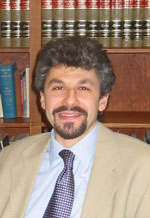WFU students examine lawful responses to terrorism
 The question of U.S. response to the terrorist attacks of Sept. 11, 2001, through both legal and military means, is thoroughly examined in a new class, “Terrorism and the Law,” offered this semester at Wake Forest University. Students are learning that anger, rage and passion, although common emotions in the wake of the attacks, have little to do with operating in a world where law must prevail in order for leaders, citizens and countries to coexist in peace.
The question of U.S. response to the terrorist attacks of Sept. 11, 2001, through both legal and military means, is thoroughly examined in a new class, “Terrorism and the Law,” offered this semester at Wake Forest University. Students are learning that anger, rage and passion, although common emotions in the wake of the attacks, have little to do with operating in a world where law must prevail in order for leaders, citizens and countries to coexist in peace.
“One of my goals in teaching this class is to help students understand the legal arguments for and against military action against any states believed to be sponsoring terrorism,” says Jonathan Marks, a visiting scholar in the Wake Forest School of Law who is teaching the class through the political science department. “Obviously, U.S. military strikes against Afghanistan, and the possibility of a U.S. war with Iraq dominate our daily discussion. I want to give students a grounding in legal analysis so they can more closely assess the (U.S.) administration’s responses to terror after September 11.”
Marks, a practicing barrister in London’s Matrix Chambers, is an international law and human rights expert. He taught a modified version of the class at the University of North Carolina at Chapel Hill and at Princeton University, where he was director of the Policy Task Force on Lawful Responses to Terrorism After 9/11 at the Woodrow Wilson School of Public and International Affairs.
Students in the class at Wake Forest look at the lawfulness of U.S. responses to terrorism from both international and U.S. perspectives, while placing an emphasis on international law and human rights concerns. Students focus on the U.S. administration’s responses to Sept. 11, 2001, although other acts of international terrorism are also considered.
Class discussion this semester has focused on timely news topics like Colin Powell’s Feb. 5 presentation to the United Nations, and the recent capture and interrogation of suspected terrorist Khalid Shaihk Mohammad.
Students like Durham junior Blake Smith have said that the best part about the class is that it is focused on things that are affecting everyday life.
“I am just overwhelmed by the relevance of this class,” said Smith, a political science major. “We deal with things that you see and read about on the news everyday. It’s like we get to see something played out in the media and then come here and talk about it, but with a better understanding of the legal issues at work. It’s really helped me to make my own decisions about what’s going on in the world.”
Jennifer Harris, a junior economics and political science major from Lawton, Okla., echoed Smith’s sentiments when she said the class has given her a greater knowledge of the expectations placed upon the U.S. under international law.
“International law can be dangerous because there are several gray areas that need to be addressed,” she said. “As I learn more about the issues, I’m finding it is important for the nations of the world to speak with one voice when addressing terrorism.”
Students are encouraged to develop their own theories and ideas about legal responses to acts of terrorism, but each student must defend his or her position to the class.
Other classes this semester have dealt with the status and treatment of the detainees at Guantonomo Bay, and students will be asked in future classes to consider the range of options for the trial of those detainees and of suspected international terrorists. In coming weeks, students will also be asked to consider the measures taken by the U.S. to curb terrorism within its borders.
Categories: Experiential Learning, University Announcements
Media Contact
Wake Forest News
media@wfu.edu
336.758.5237



